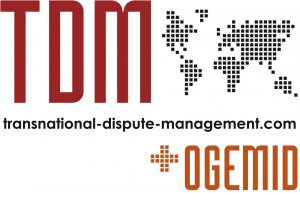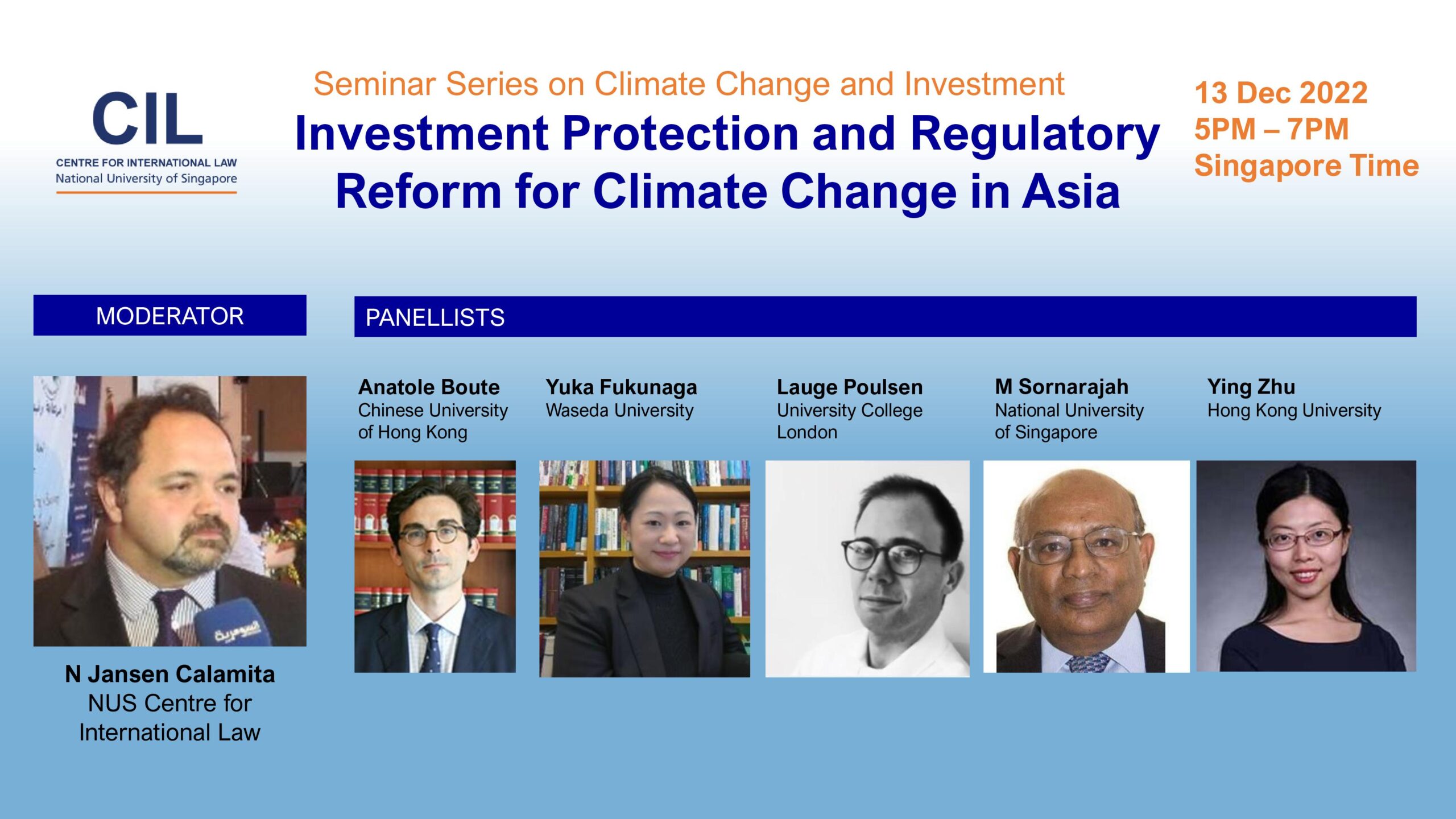Venue
Start
End
Time
Seminar 1 of 5
5:00 pm – 7:00 pm (SGT) / 9:00 am – 11:00 am (GMT) / 10:00 am – 12:00 pm (CET)
Upcoming webinars https://cil.nus.edu.sg/seminar-series-on-climate-change-and-investment/
Background This seminar is the first in a series of six seminars being organised by the Centre for International Law that will examine how international law can serve as a tool to support Paris-aligned investment flows. Under Article 2(1)(c) of the Paris Agreement, states have committed to strengthening the global response to climate change by, inter alia, “making finance flows consistent with a pathway towards low greenhouse gas emissions and climate-resilient development.” It is hard to overstate the magnitude of this ambition, essentially requiring the wholesale adjustment of state economic regulation and private sector investment approaches across the globe in order to limit financial flows to carbon-intensive activities and redirect those flows to Paris-aligned ones.
Private financing plays a pivotal role in the ability of states to curb greenhouse gas (GHG) emissions and contain climate change while coping with its effects. According to the IMF, developing economies must collectively invest at least $1 trillion in energy infrastructure by 2030 and $3 trillion to $6 trillion across all sectors per year by 2050 to mitigate climate change. As a result, the proper alignment of the international legal framework for investment – whether in terms of investment protection, investment facilitation, or standards and guidelines applicable to non-state actors – is of critical importance to addressing the existential threat posed by climate change.
The series focuses broadly on Asia. Not only does Asia account for 60% of the world’s population, but it also accounts for approximately 53% of greenhouse gas emissions. Moreover, compared to regulatory and treaty reform discussions in Europe and North America, the situation in Asia is often overlooked. To that end, we hope this series can contribute to closing that gap.
What This Seminar is About This seminar is the first in a series of six seminars being organised by CIL that will examine how international law can serve as a tool to support Paris-aligned investment flows and not simply as a source of increased legal risk for states undertaking reforms. To that end, in this seminar and in this series, we ask broadly what role states in Asia can play in creating solutions, whether through the leadership of economic blocs like ASEAN or larger economies like China, India, Japan and Korea. Moreover, we also ask whether states in Asia are willing to lead in this space.
This seminar addresses the implications of substantive investment treaty protections on states’ adoption of climate change mitigation measures. This first seminar begins by considering the degree to which Asian investment treaties provide states with sufficient regulatory space to adopt bona fide climate change mitigation measures without risk of investor claims. Further, this seminar evaluates how disagreements in the negotiations to reform the Energy Charter Treaty reveal a split between Europe and Asia, especially Japan, on the appropriate role (and future) of investment treaties with respect to energy investments. Finally, this seminar takes note of the OECD’s important work on the Future of Investment Treaties, which is addressing many of these issues, and asks how to ensure that Asian experiences and conditions are taken into account in future reform agendas.
For information about future webinars in the Series, see https://cil.nus.edu.sg/seminar-series-on-climate-change-and-investment/
Programme
Welcome Remarks
- Nilüfer Oral (Director, NUS Centre for International Law)
Moderator
- N Jansen Calamita (Head, Investment Law & Policy; Centre for International Law; Research Associate Professor, Faculty of Law, National University of Singapore)
- “Climate Change Reforms and State Risk Exposure in Asian Treaties”
Panellists
- Anatole Boute (Professor, The Chinese University of Hong Kong)
- “The Role of the ECT for the Protection of Low-carbon Investments”
- Yuka Fukunaga (Professor, Waseda University)
- “The ECT, its Future, and the Divide between Europe and Japan”
- Lauge Poulsen (Professor of International Relations & Law, University College London)
- “The OECD’s Work on Investment Treaties and Climate Policy”
- M Sornarajah (Emeritus Professor, Faculty of Law, National University of Singapore)
- “Fiddling while Rome Burns: Investment Treaties in the Face of Climate Change”
- Ying Zhu (Assistant Professor, Hong Kong University)
- “Chinese Investment Treaties and Climate Change”
 Transnational Dispute Management (TDM, ISSN 1875-4120) is a comprehensive and innovative information service on the management of international disputes, with a focus on the rapidly evolving area of investment arbitration, but also in other significant areas of international investment (such as oil, gas, energy, infrastructure, mining, utilities etc).
Transnational Dispute Management (TDM, ISSN 1875-4120) is a comprehensive and innovative information service on the management of international disputes, with a focus on the rapidly evolving area of investment arbitration, but also in other significant areas of international investment (such as oil, gas, energy, infrastructure, mining, utilities etc).
It deals both with formal adjudicatory procedures (mainly investment and commercial arbitration), but also mediation/ADR methods, negotiation and managerial ways to manage transnational disputes efficiently. See here for more information. You can apply for a free OGEMID trial membership and students can sign up for Young-OGEMID (which is free).


